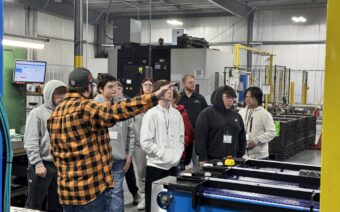
October 6, 2025
NORTHEAST WISCONSIN – Northeast Wisconsin employers have long turned to Fox Valley Technical College (FVTC) Business & Industry Services (BIS) for customized training to keep their teams sharp.
Thanks to a $950,000 Workforce Advancement Training grant awarded through the Wisconsin Technical College System (WTCS), that work is getting a boost – a move Kari Meixl, director of BIS at FVTC, said comes at a critical time when attracting and retaining talent is more difficult than ever.
For years, Meixl said BIS has provided customized training to help companies upskill their employees.
These grants, she said, are part of the state’s $5 million annual investment in workforce development and allows the college to provide grants to employers to reduce their out-of-pocket cost for customized training by BIS.
“These grants allow us to deliver high-impact, industry-specific training that directly supports the needs of our regional employers,” she said. “They also greatly help employers offset the cost of high-quality training, making it more accessible to invest in their workforce and stay competitive in today’s fast-changing environment.”
Meixl said the funding is of significant value for employers in key sectors, such as manufacturing, health care, transportation and leadership development.
Training programs, she said, will focus on both technical and soft/durable skills – including safety, automation, data analytics and strategic planning – tailored to meet the evolving needs of local industries.
“These are a reflection of what we have here and the very in-demand, hard-to-fill positions that companies are facing,” she said.
For example, Meixl said in health care, that may include patient care technicians and nursing assistants; or in transportation, employees with their Class A and B commercial driving licenses (CDLs).
Meixl said many companies bring employees in at entry-level positions and use the training BIS provides to tap into their potential and upskill.
The training also provides a pathway for exploring areas such as data analytics, which may be new territory for some organizations.
“For some companies, [analytics] is a bit of a leap or something they are unsure how to navigate,” she said. “We provide a less costly avenue for them to explore that, opening a door they otherwise wouldn’t because they can justify the cost and learn how they could apply it to their business.”
Part of the process of writing the grants, Meixl said, is to perform outreach to as many businesses in FVTC’s footprint as possible – that includes businesses in all of Calumet, Outagamie, Waupaca, Waushara and Winnebago counties and parts of Brown, Manitowoc, Portage and Shawano counties.
“We reach out to get a pulse on what they anticipate their training needs to be in the coming year, both in categories as well as quantity,” she said. “We take all of that feedback into account when we write the grants and put together budgets.”

For example, Meixl said if an employer expresses interest in training on leadership essentials, BIS calculates the duration (four hours of training) and the cost.
If the employer qualifies for the grant, Meixl said they can then apply approximately half the cost to the grant.
Qualities vs. skills
Nowadays, Meixl said employers are placing greater emphasis on qualities like reliability, resilience, a strong work ethic and a positive attitude – and are recognizing they can partner with BIS to provide the job-specific training employees need to succeed in key roles.
“Employers are shifting their mindset in how they are identifying the people they want on their teams,” she said. “They know we can train them, sometimes [in house] and sometimes with experts from other areas, such as the Business & Industry Services team.”
Meixl said her ongoing goal is to make employers in the district aware that her team seeks to be companies’ training partners.
And she said she believes BIS’s offerings are more relevant now than ever.
“With the nature of the economy and the market we’re in, [employers] need to be extremely adaptable and flexible in how they do business now versus even a year or two ago,” she said. “They can use training as a way to evolve and adapt to what’s happening with their suppliers and customers – they can’t risk sitting back and doing things exactly the way they always have.”
BIS’ offerings for businesses, Meixl said, are custom-created, so whether a company is exploring data analytics or first-time leadership, it’s tailored to the needs of both their business and its employees.
“There is very little that’s cookie-cutter about it,” she said. “Our trainers are really good about customizing almost everything we do. Leadership training for a maintenance person being promoted to foreman or shift manager with no experience whatsoever in supervision or leadership will look much different than the mid-level managers who are escalating to the C-level.”
Part of the trainers’ and account managers’ work, Meixl said, entails hosting exploratory calls with businesses to learn their training goals, as well as participants’ skill-sets.
Even something as consistent as OSHA 30-Hour Training, she said, is positioned to serve the business needs.
“OSHA training is per OSHA standards,” she said, “but every business has different safety risks and concerns.”
Meixl said she and the BIS team hope that raising awareness about the grant funding will also help spotlight the broader services BIS offers.
Though the team has already provided training to 100 area employers, she said they’re aiming to expand their reach even further.
“We work with all sizes – from start-ups to large corporations – depending on their needs and what they may or may not have for internal resources,” she said.
In many cases, Meixl said they can serve a single business in a multitude of ways, from training on safety to leadership, all through different grants.
On site, on demand, on target
Meixl said the training occurs where it’s needed, on site or on campus, and when it’s needed, to be inclusive of multiple shifts of employees.
“We’ll do training at 6 a.m. and midnight to hit the third shift, if that’s what’s needed,” she said. “We want to be businesses’ training partner…, meeting them where they are, customizing training and offering it when and where they need it most.”
That’s something Tiffany Suttner, human resources director at IPAP, said her company can attest to.
Suttner said the Appleton-based company creates supply chain efficiencies within the food industry, operating as the No. 1 source for foodservice consolidation and redistribution.

IPAP, she said, has worked with BIS for several years, providing all 65 of its employees training through grant-funded courses.
“[BIS] works with us to train every member of the organization, from our new hires to the leadership team,” she said.
Suttner said IPAP restructured its leadership team about two years ago, and in the process promoted several employees without previous leadership experience into leadership roles.
BIS, she said, has provided training on situational coaching, working with different personality types and more as part of a curated leadership series of grant-funded training.
“This has given our frontline supervisors necessary skills to take into the future,” she said. “It [provided] core foundational content for them.”
Suttner said the training grants are fundamental to the company’s ability to deliver training to the team.
“If we didn’t have the grant funding, we wouldn’t be able to do the amount of training we do,” she said. “Jennifer [Buelow Fischer – a member of the BIS team –] has been instrumental, helping us to look at our needs and redefining or customizing some of the training as needed. That customization has been key.”
Mary Curtin, chief people and culture officer at 4imprint, Inc., a direct marketer of promotional products, said she couldn’t agree more.
The partnership with BIS, Curtin said, has operated as an extension of 4imprint’s internal training team.
The training grants, she said, empower the largely Oshkosh-based workforce by building a culture of professional development and operational excellence among its 1,700 employees.
Curtin said 4imprint’s training is one of the core benefits they provide to associates – because working in partnership with BIS has allowed them to offer training to a wider group of team members, particularly with a focus on continuous improvement.
“Our business originally started as a distributor, and we have expanded and grown our operation, including a production distribution center,” she said. “So, we are looking at skillsets that are particular to that part of our operation. Continuous improvement ranks highly in terms of whether there is a more efficient way to do something.”
Curtin said she appreciates that this type of training continuously sparks new ideas among employees.
“It’s not just a one-and-done training,” she said. “We keep the momentum going throughout the business after the training.”

Curtin said the grants have allowed 4imprint to expand training offerings beyond leadership to team members on the production floor.
“It varies on an annual basis [depending] on the needs of the business, but we also have identified skillsets that would be helpful as our team members grow and develop in their roles, including our frontline leaders and team leaders,” she said.
Curtin said oftentimes, these roles involve internal promotions, and the goal is to equip employees with resources to succeed – from presentation skills to managing multiple priorities and effective time management.
“The grants have offered us a way to expand our range of offerings, the resources and capabilities we can provide to further team members,” she said. “We try to create a holistic experience and take care of our associates, looking at them not only for who they are at work, but what we can do to develop them as [people].”
For more information about training opportunities through FVTC’s Business & Industry Services, visit fvtc.edu/bis.
 Gourmet, on-the-go food options along Sturgeon Bay’s waterfront
Gourmet, on-the-go food options along Sturgeon Bay’s waterfront 4imprint completes 170,000-square-foot expansion
4imprint completes 170,000-square-foot expansion







